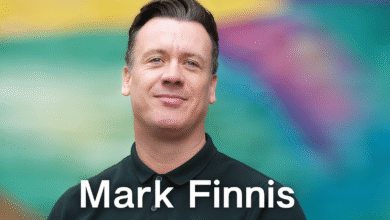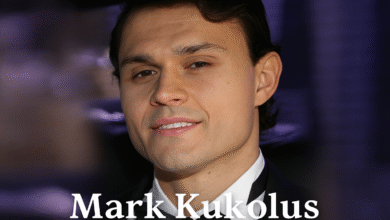Mark Wadhwa: Reviving Culture Through Real Estate and Vinyl Legacy
How a British Entrepreneur Merged Urban Development, Arts, and Music into a Lasting Impact

Table of Contents
ToggleIntroduction
Mark Wadhwa is a British entrepreneur best known for fusing property development with cultural revivalism. From preserving vinyl record manufacturing to transforming Brutalist buildings into art-centric hubs, Wadhwa exemplifies a unique blend of business and creativity. His projects such as The Vinyl Factory and 180 The Strand have become iconic symbols of urban regeneration and cultural collaboration in London.
With a career spanning over two decades, Mark Wadhwa has left an indelible mark on London’s cultural, musical, and architectural landscapes. This article explores his entrepreneurial ventures, personal background, and continuing impact on British arts and urban life.
Quick Bio
| Key Info | Details |
|---|---|
| Full Name | Mark Wadhwa |
| Date of Birth | February 1961 |
| Age (2025) | 64 years old |
| Nationality | British |
| Ethnicity | Anglo-Indian (Punjabi origin) |
| Accent | British |
| Spouse | Alex Eagle |
| Known For | The Vinyl Factory, 180 The Strand |
| Business Focus | Cultural real estate, creative ventures |
| Active Since | Late 1990s |
Integrating Culture with Commerce
Mark Wadhwa is not a conventional real estate developer. His approach goes beyond building ownership and lease management—he actively reinvents spaces to serve as cultural landmarks. He sees value in aligning urban utility with artistic expression, a philosophy that has given rise to hybrid spaces across London.
In doing so, Wadhwa challenges the status quo of property development. His investment model involves retaining ownership of venues while hosting world-class events, exhibitions, and music collaborations. This has drawn interest from international art houses, fashion brands, and tech innovators seeking experiential venues.
Long-Term Vision over Short-Term Gains
Wadhwa’s projects are typically long-term in nature. His purchase and transformation of 180 The Strand began in 2012, and he continues to expand its cultural significance in 2025. Rather than flipping assets quickly for profit, he develops lasting ecosystems around them. This strategic patience has established his ventures as cornerstones in London’s evolving creative economy.
180 The Strand: A Creative Epicentre
The Brutalist Beginning
180 The Strand is arguably Mark Wadhwa’s most recognizable accomplishment. The 1970s-era Brutalist structure was once overlooked and underutilized. In 2012, Wadhwa acquired the site with a vision to transform it into a multidisciplinary cultural hub. Over the years, it has evolved into a landmark where art, technology, fashion, and commerce intersect.
Today, 180 The Strand hosts an eclectic mix of tenants and events, including art installations, fashion weeks, tech exhibitions, and digital studio spaces. The building’s transformation is a case study in how underappreciated architecture can be revitalized into cultural goldmines.
A Magnet for Global Creativity
The venue is home to Soho Works, Dazed Media, TikTok studios, and Charlotte Tilbury’s creative team. It has also collaborated with Prada Mode, Theaster Gates, and international music artists. This magnetic appeal is the result of Wadhwa’s hands-on curation of tenants and programming, ensuring the building remains at the forefront of global creative dialogue.
The Vinyl Factory: Preserving Analog Heritage
Revival of EMI’s Legacy
Before his work on 180 The Strand, Mark Wadhwa made headlines for reviving EMI’s historic vinyl record pressing plant in Hayes. This factory, once facing closure, was bought and maintained by Wadhwa to preserve not only its heritage but also its operational capabilities. Today, The Vinyl Factory presses millions of records annually, including special editions and limited releases.
This revival effort wasn’t just nostalgic—it was prescient. In a time when vinyl demand was resurging, Wadhwa positioned himself as a leader in the niche market. The factory has since become a trusted partner for artists seeking premium-quality records.
Fusion of Music, Art, and Business
The Vinyl Factory isn’t just a manufacturing facility; it also functions as a platform for creative collaborations. Wadhwa has supported visual artists, musicians, and fashion designers in producing multimedia experiences. These collaborations often find their way into events hosted at 180 The Strand, showcasing how his ventures are interlinked in mission and execution.
Personal Life and Professional Ethos
Family and Relationships
Mark Wadhwa is married to Alex Eagle, a creative entrepreneur in her own right. She runs the Alex Eagle Studio and plays an active role in fashion and lifestyle design. Together, the couple represents a powerhouse of artistic and entrepreneurial energy within the London cultural scene.
Their partnership underscores a shared philosophy of blending aesthetics with business sensibility. While Eagle focuses on curation and branding, Wadhwa develops the physical and economic infrastructure that enables such creativity to flourish.
Leadership with Purpose
Wadhwa maintains a relatively low public profile but leads with quiet influence. He empowers teams, trusts creative collaborators, and ensures his projects reflect a long-term cultural purpose. Unlike transactional entrepreneurs, he is known for nurturing relationships that amplify community, innovation, and legacy.
Latest News & Ongoing Impact
Cultural Accolades in 2025
In 2025, Mark Wadhwa and his projects continue to receive praise from major arts and business publications. Theaster Gates, an internationally renowned artist, has called 180 The Strand “one of the most important places for contemporary culture in London.” His buildings remain featured in exhibitions, architecture journals, and global creative media.
Wadhwa’s model of embedding culture into property development is now influencing emerging developers and city planners across Europe. As cities seek to balance commercial success with artistic identity, Wadhwa’s strategies offer a compelling blueprint.
Expanding His Footprint
While 180 The Strand remains the flagship, Wadhwa is exploring further cultural regeneration projects, particularly in central and East London. His next goal is to scale his vision without compromising the artistic integrity that made his current ventures successful. With growing demand for creative space in urban settings, his model appears both sustainable and scalable.
Conclusion
Mark Wadhwa represents a rare fusion of real estate savvy and artistic passion. His legacy lies not only in the buildings he owns but in the communities, cultures, and conversations they foster. By preserving the past through The Vinyl Factory and reinventing the present at 180 The Strand, he continues to influence the future of culture-led development in the UK and beyond.
Wadhwa’s career exemplifies what’s possible when business is driven by creativity and vision. In an era where cities often struggle with soulless development, his work stands as a testament to the power of culture to transform space—and society.
Frequently Asked Questions (FAQ)
Who is Mark Wadhwa?
Mark Wadhwa is a British entrepreneur known for cultural real estate projects such as The Vinyl Factory and 180 The Strand.
What is Mark Wadhwa’s most famous project?
He is best known for revitalizing 180 The Strand into a cultural hub for art, fashion, and tech events.
Is Mark Wadhwa still active in 2025?
Yes, he remains a key figure in London’s cultural development scene and continues to expand his ventures.
Who is Mark Wadhwa married to?
He is married to Alex Eagle, a renowned fashion and interior designer.
What makes Mark Wadhwa unique as a businessperson?
His ability to merge commercial development with artistic and cultural programming sets him apart in the real estate industry.



